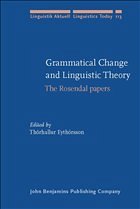Nicht lieferbar

Grammatical Change and Linguistic Theory
The Rosendal papers
Versandkostenfrei!
Nicht lieferbar
This book contains 15 revised papers originally presented at a symposium at Rosendal, Norway, under the aegis of The Centre for Advanced Study (CAS) at the Norwegian Academy of Science and Letters. The overall theme of the volume is ‘internal factors in grammatical change.’ The papers focus on fundamental questions in theoretically-based historical linguistics from a broad perspective. Several of the papers relate to grammaticalization in different ways, but are generally critical of ‘Grammaticalization Theory’. Further papers focus on the causes of syntactic change, pinpointing both e...
This book contains 15 revised papers originally presented at a symposium at Rosendal, Norway, under the aegis of The Centre for Advanced Study (CAS) at the Norwegian Academy of Science and Letters. The overall theme of the volume is ‘internal factors in grammatical change.’ The papers focus on fundamental questions in theoretically-based historical linguistics from a broad perspective. Several of the papers relate to grammaticalization in different ways, but are generally critical of ‘Grammaticalization Theory’. Further papers focus on the causes of syntactic change, pinpointing both extra-syntactic (exogenous) causes and - more controversially - internally driven (endogenous) causes. The volume is rounded up by contributions on morphological change ‘by itself.’ A wide range of languages is covered, including Tsova-Tush (Nakh-Dagestan), Zoque, and Athapaskan languages, in addition to Indo-European languages, both the more familiar ones and some less well-studied varieties.
Table of contents:
- Introduction
- Grammaticalization in a speaker-oriented theory of change
- 'Degrammaticalization' versus typology: Reflections on a strained relationship
- Cascading parameter changes: Internally-driven change in Middle and Early Modern English
- The rise and development of analytic perfects in Italo-Romance
- Raising patterns in Old High German
- The new passive in Icelandic really is a passive
- A mentalist interpretation of grammaticalization theory
- Linguistic cycles and Economy Principle: The role of Universal Grammar in language change
- Explaining exuberant agreement
- From resultatives to anteriors in Ancient Greek: On the role of paradigmaticity in semantic change
- Lexical nonsense and morphological sense: On the real importance of 'folk etymology' and related phenomena for historical linguists
- The diffusion of systemic changes through the inflectional system: Evidence from person-number inflection in the Nordic languages and German
- Left Branch Extraction of nominal modifiers in Old Scandinavian
- On incorporation in Athapaskan languages: Aspects of language change
- Argument marking from Latin to Modern Romance languages: An illustration of 'combined grammaticalisation processes'
- Index
Table of contents:
- Introduction
- Grammaticalization in a speaker-oriented theory of change
- 'Degrammaticalization' versus typology: Reflections on a strained relationship
- Cascading parameter changes: Internally-driven change in Middle and Early Modern English
- The rise and development of analytic perfects in Italo-Romance
- Raising patterns in Old High German
- The new passive in Icelandic really is a passive
- A mentalist interpretation of grammaticalization theory
- Linguistic cycles and Economy Principle: The role of Universal Grammar in language change
- Explaining exuberant agreement
- From resultatives to anteriors in Ancient Greek: On the role of paradigmaticity in semantic change
- Lexical nonsense and morphological sense: On the real importance of 'folk etymology' and related phenomena for historical linguists
- The diffusion of systemic changes through the inflectional system: Evidence from person-number inflection in the Nordic languages and German
- Left Branch Extraction of nominal modifiers in Old Scandinavian
- On incorporation in Athapaskan languages: Aspects of language change
- Argument marking from Latin to Modern Romance languages: An illustration of 'combined grammaticalisation processes'
- Index




